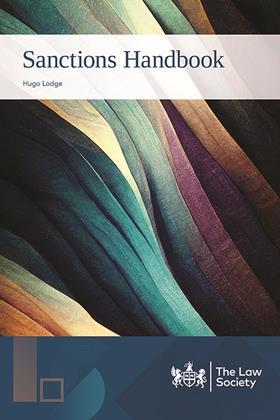Sanctions Handbook
Hugo Lodge
£130, Law Society
★★★★★
There are books that inform, and books that transform the way we think about a subject. Hugo Lodge’s Sanctions Handbook is firmly in the latter category – a work that not only demystifies the labyrinthine world of UK sanctions but also equips its readers with the tools to navigate it with confidence and clarity.
The opening chapter, aptly titled ‘Don’t Panic’, sets the tone for the entire book. In a field where the stakes are high – criminal and civil liabilities loom large and the consequences of missteps can be severe – Lodge’s invitation to remain calm is both refreshing and essential. It is a subtle nod to the psychological dimension of compliance work, where the pressure of the moment can cloud judgement and impede effective decision-making. One cannot help but wonder why more authors in the compliance and regulation sphere do not adopt this approach. Lodge’s style is reminiscent of the best educators: he understands that clarity is the antidote to panic.
Throughout, the book is a masterclass in concise, accessible writing. The UK sanctions regime is notoriously complex, yet Lodge distils its essence without sacrificing nuance. His explanations are direct, his structure logical, and his prose mercifully clear when tackling jargon and quirks of the system. For the reader – whether a seasoned regulatory solicitor, a large-firm general counsel, or a newly appointed COLP trying to navigate the maze– this is a rare gift.

The chapters on licences and exemptions are particularly noteworthy. These are the pressure points for international firms and anyone engaging with sanctioned individuals or entities.
Lodge’s guidance is practical, grounded in real-world scenarios and supported by detailed quotations from the UK government’s own guidance. Yet he is careful to remind us as early as the preface that the sanctions regime is not static; it is ‘in flux’. ‘Trust but verify’ would be my observation on the quoted guidance and remain vigilant and adaptable in a shifting regulatory landscape.
Perhaps the book’s greatest strength lies in its pragmatism. The checklists provided are not mere appendices – they are actionable frameworks that empower law firms and solicitors to address sanctions issues systematically. The case studies, too, are straightforward and relevant, offering concrete examples that illuminate the principles discussed. This is not theory for theory’s sake; it is knowledge in action.
In an era of increasing regulatory complexity and shrinking margins for error, the ability to think clearly under pressure is more valuable than ever. Artificial intelligence and outsourced advice cannot think for law firms. This handbook could be treated as a catalyst for better thinking, better practice and, ultimately, better outcomes.
For general counsel, regulatory solicitors and COLPs, this book is an essential addition to the library. But its appeal is broader still: anyone who values clarity, rigour and practical application of the regulatory challenges will find much to admire here.
Paul Bennett is a legal services, partnership and regulatory partner with north-west firm Bennett Briegal LLP































No comments yet